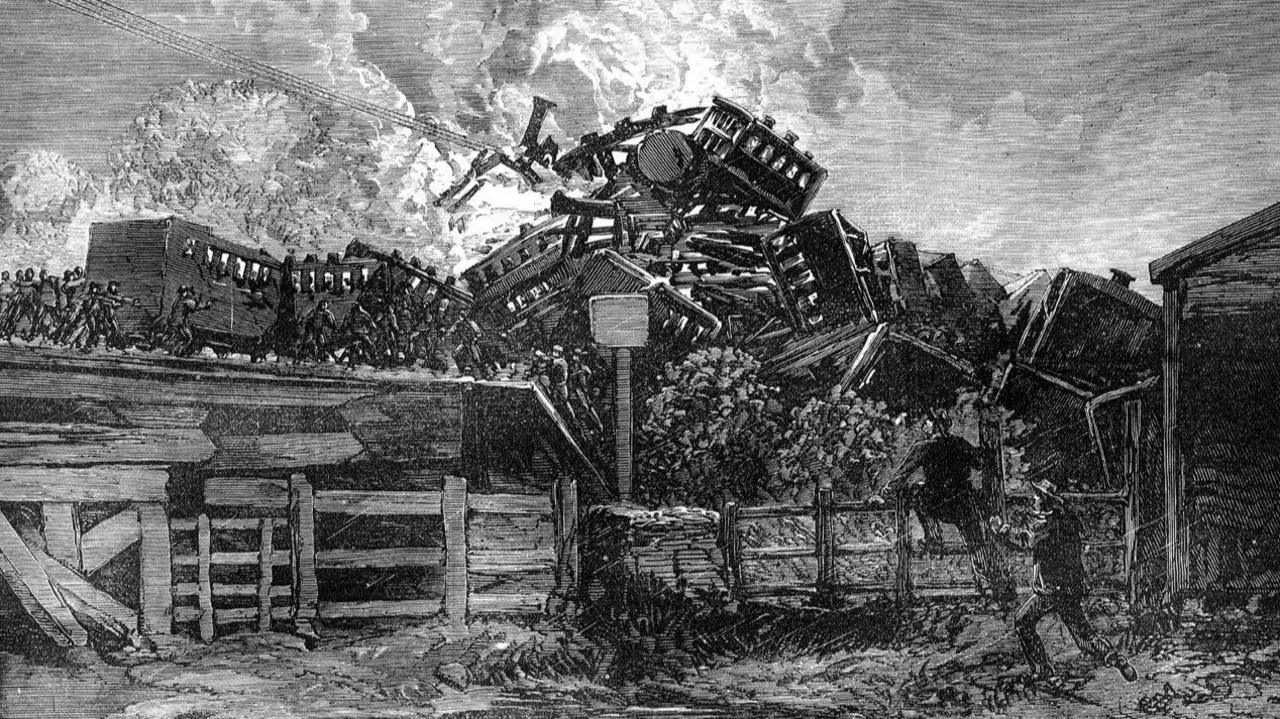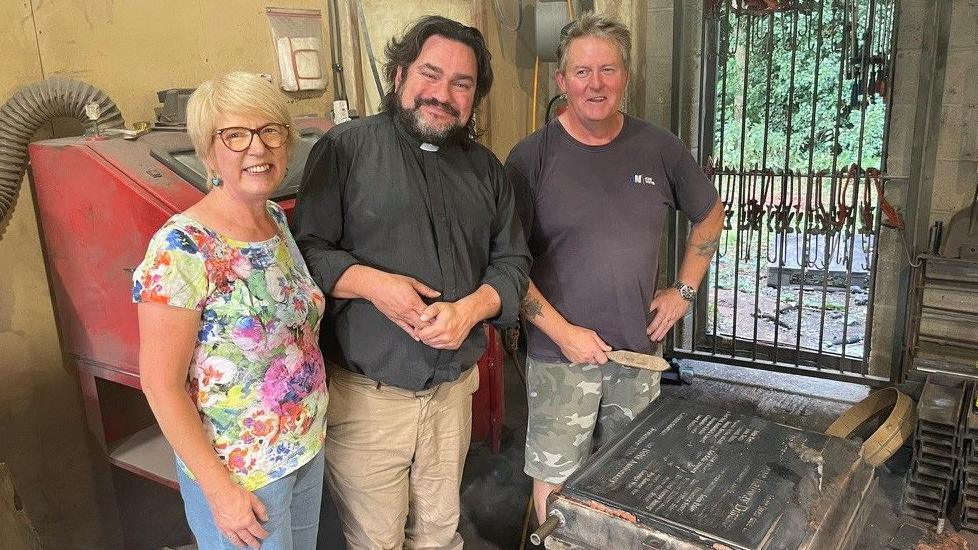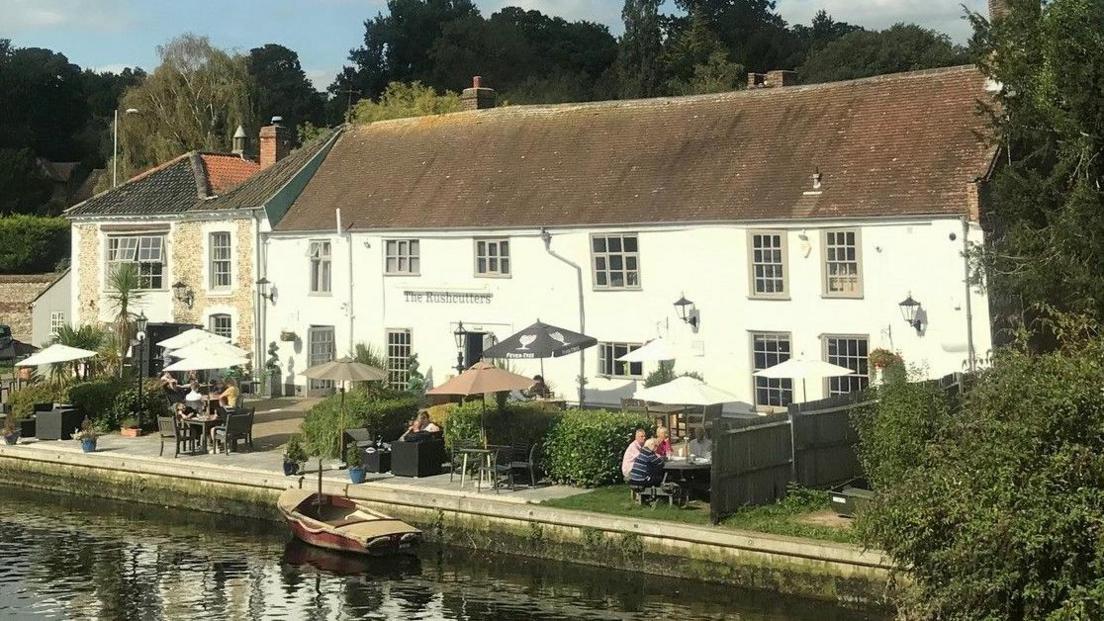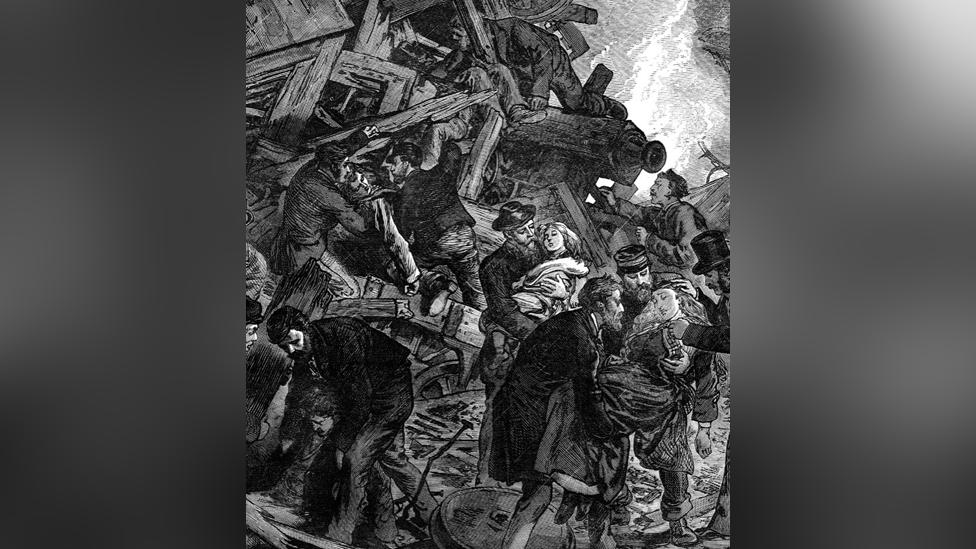Rail disaster victims remembered 150 years on

Illustrations from the time showed the carriages piled on top of each other
- Published
A Victorian railway crash which claimed 28 lives and forced through safety measures that are still in use today is being remembered in the community where people scrambled to help the dead, dying and injured 150 years ago.
On the night of 10 September 1874, a fatal misunderstanding led to a mail train from Great Yarmouth and an express from London colliding head-on on the single track at Thorpe-next-Norwich.
"Heroic" villagers in what is now Thorpe St Andrew, just outside the city, "ran out in their droves", lit bonfires to help rescuers and hauled people from the wreckage, said author Phyllida Scrivens.
"It is absolutely fascinating finding out about every one of the lives affected," said Mrs Scrivens, who has written about the disaster and will be taking part in commemorative events, including the unveiling of a plaque.
Brandy as anesthetic

Phyllida Scrivens, Rev James Stewart, the rector of Thorpe St Andrew, and plaque maker Gary Hubbard with the memorial to be placed in the church
The catastrophe unfolded when both trains were given the all-clear to proceed along the single track.
Moments later, station staff in Norwich realised the mistake but were powerless to avert disaster less than two miles down the line, at 21:30 local time.
"There was nothing they could do but send for doctors from the hospital and around the city, and they boarded a train with their surgical instruments and little bottles of brandy to be used as anesthetic," explained Mrs Scrivens.
"The engines had been sent up like a pyramid and a lot of the carriages had been smashed to pieces, with splinters floating down like confetti on to the marshes and people were thrown from the carriages."
The drivers and firemen on both trains were killed, along with 17 passengers. Four others died later from their injuries, with 73 passengers and two guards seriously injured.
A temporary field hospital and morgue was set up at the Three Tuns, now the Rushcutters pub.
Eighteen-year-old Ellen Ramsdale had her leg amputated at the inn by fellow passenger Dr Peter Eade, who had dusted himself down to get stuck in with other medics.

Mrs Scrivens said a view of the inn from the rail bridge - seen here in 2020 - would have been the last thing many express passengers would have seen before the crash
"Norwich would be very different today had he and passenger Charles Gilman not survived," said Mrs Scrivens.
"Both men went to become Lord Mayors, were knighted by Queen Victoria and were huge benefactors for the city.
"Dr Eade wrote up detailed reports for the British Medical Journal, which helped doctors at subsequent railway accidents."
The crash made headlines around the world as newspapers covered the subsequent deaths, manslaughter trial, compensation cases and inquiry.
Communication improvements which were already being devised were implemented throughout the network to ensure similar errors and misunderstandings could not be repeated.

The crash was the most serious single-track collision the country had seen
Mrs Scrivens uncovered many tragic stories during her research for her book The Great Thorpe Railway Disaster 1874, including that of railway worker John Betts, who had been on a day out with his wife and two sons. One of the boys, Charles, 3, was the only family member to survive.
Their names and those of other victims have been added to a plaque to be dedicated at Thorpe St Andrew Parish Church on Sunday by the Bishop of Norwich, with descendants attending from around the country and as far away as Norway.
The church is also hosting an exhibition, with Mrs Scrivens giving an illustrated talk and two guided walks taking in the key sites.
"We still have disasters today - like Grenfell - where change only comes about because people have lost their lives after mistakes were made," said Mrs Scrivens.
"Many people in Thorpe have not heard of the railway disaster, but for me this week is a culmination of years of work and a labour of love.
"The unveiling of the plaque, with some of the families here, is very special and I'm looking forward to showing them the pub and where it all happened."
1874: The Thorpe rail disaster
- Attribution
Get in touch
Do you have a story suggestion for Norfolk?
Follow Norfolk news on BBC Sounds, Facebook, external, Instagram, external and X, external.